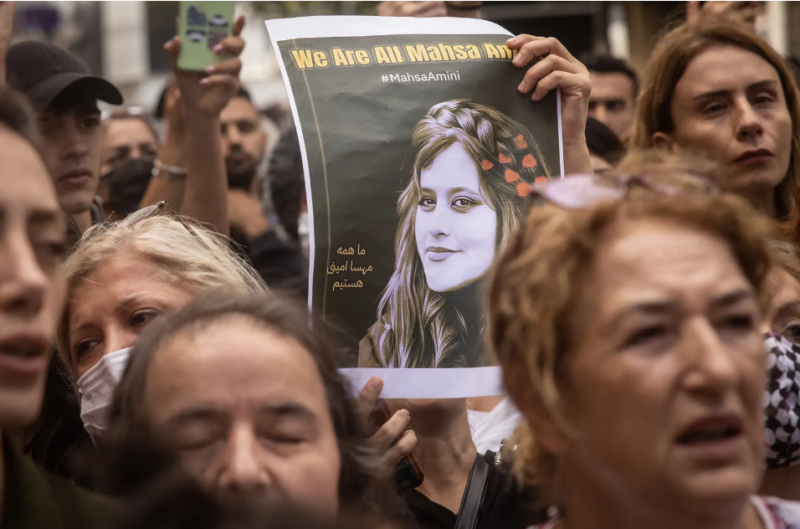
United States: Morality The Islamic Republic has been shaken as protests over the death of a young woman in police custody, with Iranian officials saying they will restrict internet access in the country until peace is restored.
Thousands of Iranians have taken to the streets in protest since the death last week of Mahsa Amini, a 22-year-old woman captured in Tehran and taken to a "re-education centre" for allegedly not wearing a hijab.
Protests have been taking place in at least 40 cities across the country, including the capital Tehran, since Friday, with demonstrators demanding an end to violence and discrimination against women as well as a mandatory end to the hijab.
Several protesters are said to have been killed in clashes with security forces.
It is impossible to confirm an exact figure outside the Iranian government, and various estimates have been provided by opposition groups, international rights organizations and local journalists. According to Amnesty International, at least 30 people have died, including four children; According to the semi-official Tasnim news agency, 17 people have died.
Officials hope that by restricting access to the Internet, they will be able to control the protest.
Iran's communications minister, Ahmed Wahidi, told state broadcaster IRIB on Friday: "The internet will remain banned until the riots end. To stop the riot organization through social media, we must impose an internet ban."
Wahidi's remarks came after videos on social media showed women removing and burning scarves on their heads and protesters shouting slogans like "Women, Life, Freedom".
The decision to further restrict Internet access came in response to a UN call for an independent investigation into Amini's death and for Iran's security forces to refrain from using "irregular force" against protesters.
Outrage over Amini's death stems from public skepticism about the state officials' account, which they claim died after a "heart attack" and falling into a coma. However, Amini's family claims that she had no pre-existing heart ailment.
Amini's death has now become a symbol of decades-long oppression of women in Iran, and her name has spread around the world, with world leaders also calling on her at the UN General Assembly in New York City this week.
The UN High Commissioner for Human Rights said on Thursday that UN experts strongly condemned state officials' use of physical violence against women in Iran.
"Iranian authorities claimed (Amini) died of natural causes after suffering a heart attack. However, some reports suggested that Amini died as a result of alleged torture and abuse," it said in a statement.
"We urge the Iranian authorities to conduct an independent, impartial and speedy investigation into the death of Ms. Amini, to make the findings public, and to hold all perpetrators accountable," the statement continued.
Internet suppression
As protests continue, Iranians are facing a third wave of "nation-level" loss of mobile Internet connectivity, according to Internet monitoring agency Netblox.
Earlier this week, the watchdog group reported that Iran was facing the most severe internet sanctions since 2019, with mobile networks largely shut down and social networks Instagram and WhatsApp banned in the country since the protests began. Were.
To circumvent internet blocks, Iranians inside and outside the country are turning to popular virtual private network (VPN) providers such as the Tor Project and Hula VPN - the top downloaded apps in Iran via the Google Play Store, Android A marketplace for downloading apps for smartphone users. , according to the monitoring service AppBrain.
However, Netblox warns that the current level of internet disruption in the country "generally cannot be handled with fraudulent software or VPNs."
Similar internet sanctions were imposed in Iran in November 2019, forcing Iranians to go almost completely offline as authorities attempt to quell nationwide protests over fuel prices.
Oracle's Internet Intelligence called it "the largest Internet shutdown ever in Iran" at the time.
Meanwhile, hacker collective Anonymous has been targeting the Iranian government online since last week, announcing several breaches of government websites on Thursday.
Using the hashtag #OpIran for Operation Iran, which gained traction on social media following Amini's death, Anonymous also tweeted on Thursday that the organization had succeeded in hacking more than 1,000 CCTV Iranian cameras, a claim CNN could not independently confirm.
UN demands investigation.
UN Secretary-General Antonio Guterres on Friday expressed concern about reports of peaceful protests being met with excessive force, resulting in the deaths and injuries of dozens.
"We call on security forces to refrain from using unnecessary or disproportionate force, and we appeal to all to exercise restraint in order to avoid further escalation," Dujarric said during the daily UNTV briefing.
The United Nations said it is closely monitoring the protests in Iran and urged authorities to "respect the right to freedom of expression, peaceful assembly, and association."
"We also call on the authorities to respect women's rights and to eliminate all forms of discrimination against women and girls, as well as to put in place effective measures to protect them from other human rights violations, in accordance with international standards."
Guterres reiterated the Acting High Commissioner for Human Rights' call for a prompt investigation into Amini's death by a "independent competent authority."
Iran's anti-hijab violence intensified, Musk said- will activate Starlink...
Is Hijab more important than life, where did we go wrong?
'First wear Hijab then...,' Iranian president refuses to give interview